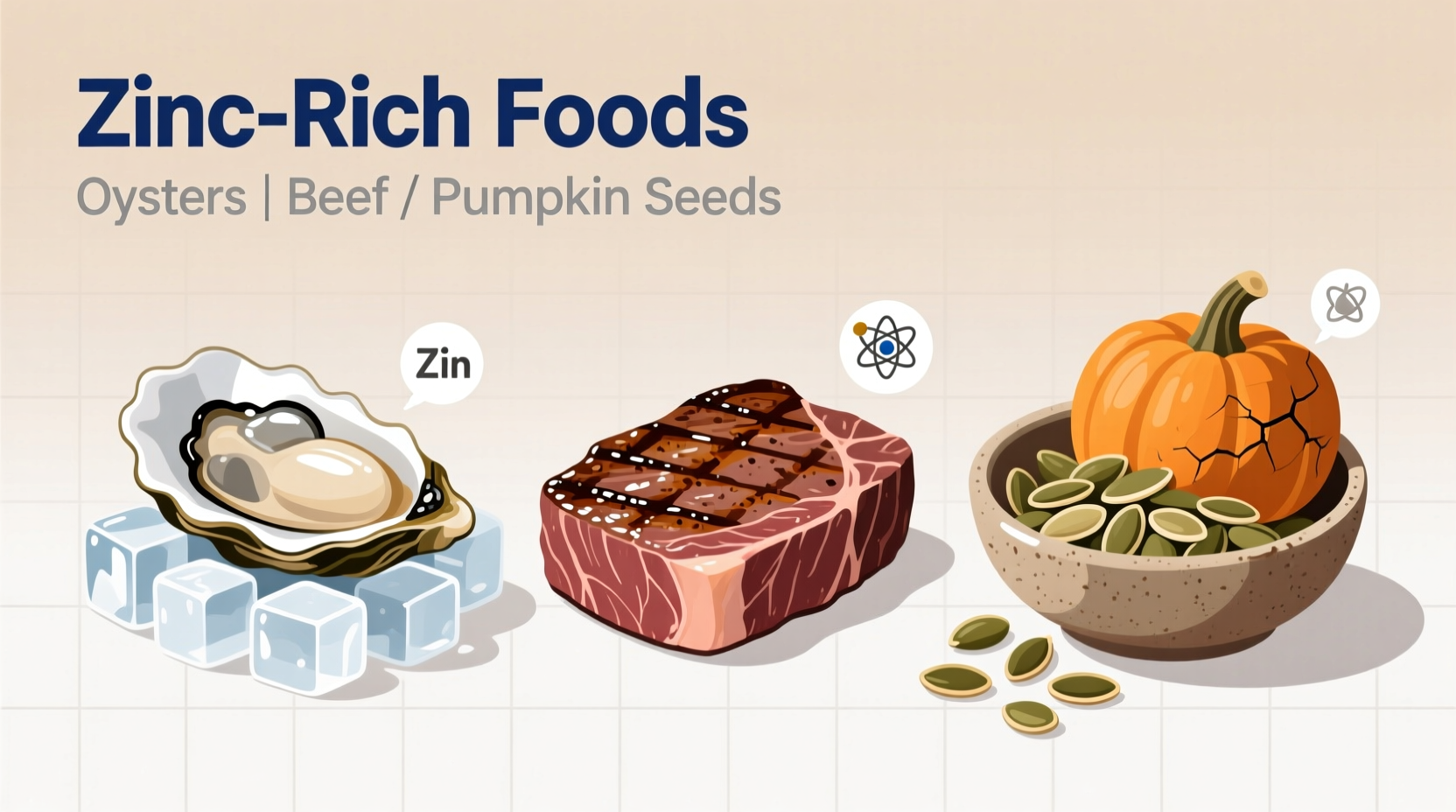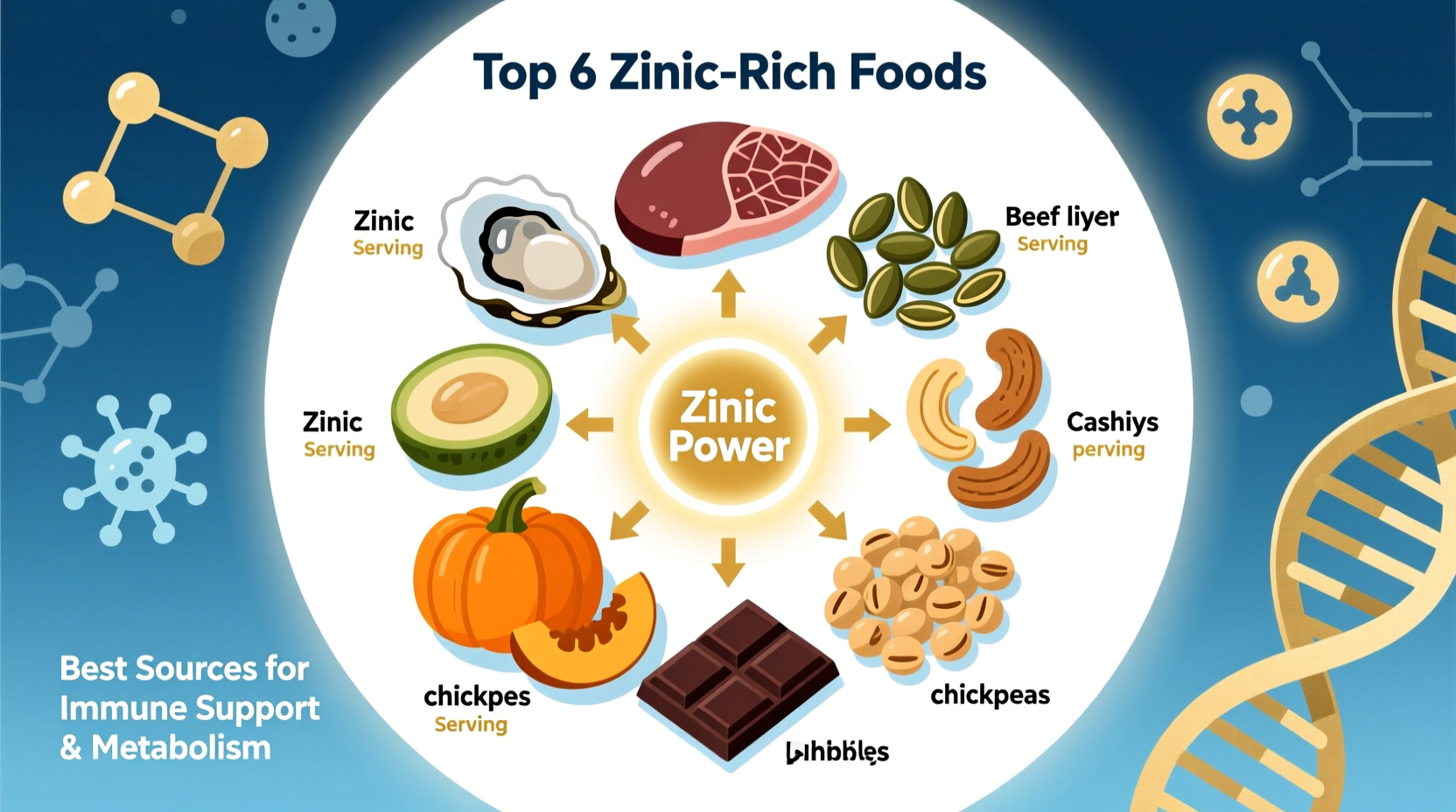Oysters contain the highest zinc content of any food, providing a remarkable 74.1 mg per 3-ounce serving—more than 670% of the daily recommended value. Beef, crab, and pumpkin seeds also rank among the top zinc-rich foods.
Discover exactly which foods deliver the most zinc to support your immune system, metabolism, and overall health. This evidence-based guide reveals the top dietary sources of zinc, how much you actually need, and practical ways to optimize your intake—backed by nutritional science and authoritative food databases.
Why Zinc Matters for Your Health
Zinc plays a critical role in over 300 enzymatic reactions in your body. According to the National Institutes of Health, this essential mineral supports:
- Immune function and wound healing
- DNA synthesis and cell division
- Proper sense of taste and smell
- Growth and development during pregnancy and childhood
Unlike some nutrients, your body doesn't store zinc efficiently, making regular dietary intake crucial. The World Health Organization identifies zinc deficiency as a significant global health concern, particularly affecting populations with limited access to animal-based foods.
Top Zinc-Rich Foods Ranked by Content
Based on the USDA FoodData Central database (Release 2023), here are the highest zinc-containing foods per standard serving:
| Food | Serving Size | Zinc (mg) | % Daily Value |
|---|---|---|---|
| Oysters, cooked | 3 oz (85g) | 74.1 | 674% |
| Beef chuck roast | 3 oz (85g) | 7.0 | 64% |
| Alaskan king crab | 3 oz (85g) | 6.5 | 59% |
| Pumpkin seeds | 1 oz (28g) | 2.2 | 20% |
| Lentils, cooked | 1 cup (198g) | 1.3 | 12% |
Animal vs. Plant Sources: Understanding Zinc Bioavailability
While both animal and plant foods contain zinc, your body absorbs zinc from animal sources more efficiently. This difference stems from phytates—compounds in plant foods that bind zinc and reduce absorption.
According to research published in the American Journal of Clinical Nutrition, zinc bioavailability from plant-based diets may be 30-50% lower than from animal-based diets. This explains why vegetarians and vegans often require up to 50% higher zinc intake to meet their needs.

Daily Zinc Requirements by Life Stage
The National Academy of Medicine established these daily zinc requirements:
- Adult men: 11 mg
- Adult women: 8 mg
- Pregnant women: 11 mg
- Lactating women: 12 mg
- Children (9-13 years): 8 mg
These values represent the minimum needed to prevent deficiency. Some researchers suggest optimal intake may be higher for certain populations, particularly older adults whose zinc absorption decreases with age.
Signs of Zinc Deficiency
Zinc deficiency often develops gradually. Common symptoms include:
- Impaired immune function (frequent infections)
- Slow wound healing
- Loss of appetite
- Changes in taste and smell perception
- Hair loss
- Skin rashes
Vegans, vegetarians, pregnant women, and older adults face higher risk of zinc deficiency. If you suspect deficiency, consult a healthcare provider rather than self-supplementing, as excessive zinc intake can cause copper deficiency and other complications.
Practical Tips to Boost Your Zinc Intake
Here's how to maximize zinc absorption from your diet:
- Pair plant zinc sources with acids: Lemon juice or vinegar in salads containing pumpkin seeds increases zinc absorption.
- Soak and sprout: Preparing beans and grains through soaking or sprouting reduces phytate content.
- Include animal proteins: Just 3 ounces of beef provides over half your daily zinc needs.
- Time your coffee: Avoid coffee or tea with zinc-rich meals as polyphenols can inhibit absorption.
- Don't overcook: Gentle cooking preserves zinc content better than prolonged high-heat methods.
When Supplements Might Be Necessary
While food sources are preferable, certain situations may warrant zinc supplementation under medical supervision:
- Diagnosed zinc deficiency
- Certain digestive disorders (Crohn's disease, ulcerative colitis)
- Post-bariatric surgery patients
- Severe vegetarians/vegans with persistent deficiency
The NIH warns that long-term zinc supplementation above 40 mg daily can cause copper deficiency and impair immune function. Always consult a healthcare provider before starting supplements.
Frequently Asked Questions
Which meat has the highest zinc content?
Beef, particularly chuck roast and brisket, contains the highest zinc content among meats, providing about 7 mg per 3-ounce serving. Lamb and pork also offer significant amounts, while poultry contains less zinc than red meats.
How can vegetarians get enough zinc?
Vegetarians can optimize zinc intake by consuming pumpkin seeds, lentils, chickpeas, and fortified cereals. Soaking, sprouting, or fermenting plant foods reduces phytates that inhibit zinc absorption. Pairing zinc-rich plant foods with acidic ingredients like lemon juice can increase absorption by up to 50%.
Does cooking affect zinc content in food?
Zinc is relatively stable during cooking compared to some other nutrients. Boiling, baking, or grilling doesn't significantly reduce zinc content. However, discarding cooking water from beans or grains can reduce zinc availability since some zinc leaches into the water. Gentle cooking methods preserve zinc better than prolonged high-heat techniques.
Can you get too much zinc from food?
It's extremely difficult to consume excessive zinc from food alone. The upper limit for zinc intake is 40 mg daily for adults, but typical high-zinc diets rarely exceed 30 mg. Oysters contain exceptionally high zinc levels, but even consuming several servings would be unlikely to cause toxicity. Problems typically arise only from excessive supplementation.
How does zinc interact with other nutrients?
Zinc competes for absorption with copper and iron. High zinc intake can reduce copper absorption, potentially leading to copper deficiency. Calcium supplements may also slightly inhibit zinc absorption when taken simultaneously. Conversely, protein enhances zinc absorption. For optimal nutrient balance, avoid taking high-dose zinc supplements with copper-rich foods or supplements without medical supervision.











 浙公网安备
33010002000092号
浙公网安备
33010002000092号 浙B2-20120091-4
浙B2-20120091-4